Philadelphia or Boston? Where’s the Best Place to Earn a Part-Time MBA

If you are interested in pursuing a degree in a diverse East Coast city, want to be surrounded by history and culture, and still immerse yourself in growing business community, two main cities come to mind: Philadelphia and Boston.
Both cities are at the center of U.S. history, and continue to be some of its largest centers of commerce and academia, with numerous opportunities to put its stellar education to work.
Surrounded by so many possibilities for professional development, an MBA student in a city like Philadelphia or Boston may not want to put their career and income on hold to pursue a full-time degree.
Thankfully, many of the business schools in Philadelphia and Boston offer part-time MBA programs, allowing students more flexibility as they kick off their careers in these exciting cities. But how to decide which one? We’ll take a look at some of the top part-time MBA programs in each metro to help you choose the right city for you.
Location
Once the capital of the United States, Philadelphia has never stopped being a center of both business and history since the time it played host to the country’s founding fathers. Home to some of the oldest and best universities in the country, Philadelphia has experienced a renaissance in recent years as young talent has become priced out of more expensive metros like New York City and Washington DC. The cost of living in Philadelphia remains fairly low, while the ever-growing business scene in the city offers the opportunity for high earning potential. This year, 14 Philadelphia-area companies made the Fortune 500 list.
Like Philadelphia, Boston has been a center of commerce and trade since the days of the Boston Tea Party. Today, the city is home to nine Fortune 500 companies, including major established firms like GE (13th on the Fortune 500 list) and newer but thriving businesses like Wayfair. However, Boston has a much higher cost of living than Philadelphia. The city currently ranks as the third most expensive city in the country.
Programs
Between the Wharton School of Business and the Harvard Business School, Philadelphia and Boston offer two of the most highly regarded MBA programs in the country. However, both of these schools only offer full-time MBA programs. Students looking for more flexibility in their schedules still have a number of stellar programs to choose from.
Most of the part-time MBA programs in the Philadelphia metro work on a hybrid structure, allowing students to take a combination of classes both online and in person. Many programs also offer students the chance to select majors or concentrations in which to specialize their business education. With a variety of possible concentrations at some of the most highly-ranked part-time programs in the country, students from these programs have gone on to find employment at major firms like DuPont, KPMG, and JPMorgan Chase.
Part-Time MBA Programs in Philadelphia Include
- Lehigh University College of Business and Economics
- Fox School of Business – Temple University
- La Salle University
- LeBow College of Business – Drexel University
- Lerner College – University of Delaware
- Rohrer College of Business – Rowan University
- Rutgers School of Business, Camden
- Villanova School of Business
- West Chester University
Like Philadelphia, Boston’s part-time MBA programs offer more flexibility for students to complete their degree on their own time. Most courses are offered in the evening or on weekends, and can be taken over the course of just two years or up to seven. Programs like the MBA at D’Amore-McKim also give students the opportunity to concentrate in fields such as Corporate Finance, Corporate Renewal, Entrepreneurship, and more.
Part-Time MBA Programs in Boston Include
- Carroll School of Management – Boston College
- D’Amore-McKim School of Business – Northeastern University
- F.W. Olin Graduate School of Business – Babson College
- Questrom School of Business – Boston University
- Sawyer Business School – Suffolk University
- Simmons School of Management
Cost
The tuition costs can vary from program to program, and can also be cheaper if the part-time program is competed online. On average, programs in the Philadelphia metro area can range from $45,000-$65,000 for the degree. The range of costs in Boston can be slightly higher, with some students spending up to $95,000 over the course of their degree.
Jobs
Although the cost of an MBA in Boston may be slightly higher than Philadelphia, the difference in average salary between the two cities may even out concerns of cost. In Boston, the average salary for someone with an MBA degree in a field like finance is $112,000, whereas in Philadelphia it is only around $90,000 per year.
McDonough MBA Consulting Club Members Collaborate with Undergrads

Georgetown McDonough MBAs are paying it forward to the undergraduate peers. According to a press release, the McDonough MBA Consulting Club conducted a series of mock case interviews with the undergraduate Management Consulting Society to better prepare the undergrads for upcoming job interviews. Continue reading…
Northwestern Kellogg Launches 10 New Courses

Northwestern University’s Kellogg School of Management has just launched ten new business courses for the 2017-18 academic year, according to a recent press release.
“We are very excited to continue our tradition of curricular innovation at Kellogg, drawing on both the scholarship or our research faculty and our connections with practice,” Senior Associate Dean for Curriculum and Teaching Mike Mazzeo said.
For data-focused business studies, the school has launched the brand new Data Exploration course, taught by finance professor Robert L. McDonald, who says; “It is now common in business to need to analyze large and unwieldy datasets. We moved from calculators to spreadsheets in the 1980s and now we need to move beyond spreadsheets.” The premise of the Data Exploration course, he added, “is that students should be able to work with and analyze raw data from a variety of sources and a variety of forms, using methods that scale. We will use R, which has become one of the dominant tools in data analytics.”
Two new marketing courses have been introduced to the curriculum: Customer Loyalty, taught by Kellogg Senior Fellow Thomas O’Toole; and Ethnographic Customer Insights, taught by adjunct professor Gina Fong. On the latter, Fong notes; “Ethnographic research is not just a way to answer important business questions, but also a way to bring the customer to life inside a company, helping make the decision-making of the company more customer-centric. Knowing the insight into the customer gives the marketer the ability to anticipate what the customer needs and wants—sometimes before he or she are able to articulate it.”
Two new collaboration and leadership programs have been introduced to the MBA curriculum as well, with Strategic Communications for Organizations, arriving next winter, and Leadership Development Models & Practices, which is available now. In addition, three new Public-Private Interface courses have been or will soon be introduced by Kellogg, covering Strategic Perspectives in Nonprofit Management, Social Impact & Technology Innovation, and Decision-Making for Sustainable Business.
As well, Kellogg has introduced courses in Commercializing Innovations and the CEO Playbook for Health System Success course, both of which will be offered in the winter and spring 2018 semesters, respectively.
You can read more about the new offerings at Kellogg here.
PcW Brings Diversity Training Course to USC

Earlier this month, PricewaterhouseCoopers (PwC) conducted a diversity training course at the University of Southern California. According to a press release, the program was part of PwC’s recruiting efforts at the Marshall School of Business and Leventhal School of Accounting. Continue reading…
What Georgetown McDonough MBA Students Learn Outside the Classroom
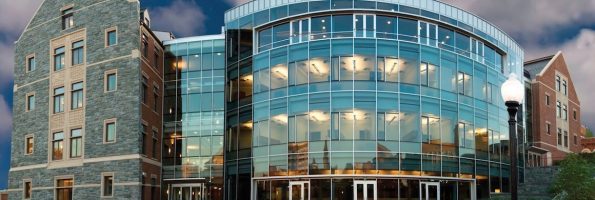
What do Colin Powell, an Indiana dairy farm, the DC Department of Public Works, and a triathalon have in common? They are all part of the fabric that comprises life outside of the classroom for MBA students at Georgetown University’s McDonough School of Business. Sure, it makes sense to judge a business school on what takes place inside the classroom. But in skimming three seemingly unrelated recent news briefs from the school, we realized that taken together they help paint a picture of what life outside the classroom can look like.
Former Secretary of State Colin Powell Speaks
In September, the former U.S. Secretary of State and Chairman of the Joint Chiefs of Staff Colin Powell visited Georgetown McDonough to speak on the subject of leadership. He discussed his former military and government experience, as well as a turning point in his career: earning his MBA. The event was part of the Stanton Distinguished Leaders Series and was hosted by the McDonough Military Association, an MBA student club for military veterans.
Faculty, staff, alumni, and students were all invited to observe the conversation, which began with Powell touching on his MBA education. He shared with attendees about how his MBA—which he earned from George Washington University in 1971—enabled him to focus “on the more human elements of leadership,” explained the McDonough press release. He also talked about how he improved his management and leadership skills by gaining a better understanding of basic human psychology.
Powell then went on to speak about his career. He shared his experience of being pulled in a variety of different directions, including public service positions, telling audience members: “You serve where you are needed. This is what service is all about.”
Then, he went on to highlight what he views as essential components of effective leadership, namely helping others, stressing the human element of an organization, and building trust. He explained that he never tried to be an authority but to influence others, stating “leadership and followership are completely enmeshed.”
Finally, he touched on the importance of diversity. “We are a vibrant economy because of immigration,” he said. “We shouldn’t demonize anyone.” He talked about how diversity is important for leadership and for building a stronger America. The event ended with questions from audience members and drew praise from many in attendance.
As Prashant Malaviya, an Associate Professor of Marketing at McDonough, said on Twitter: “Honor and privilege to welcome Colin Powel to Georgetown McDonough. Amazing talk! Thank you!”
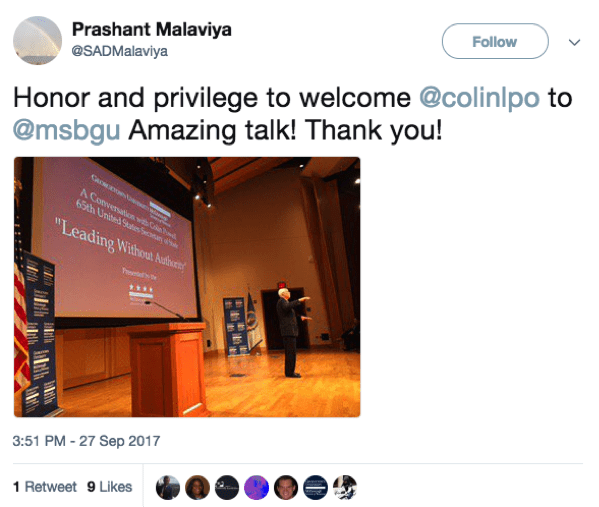
Hands-On Experience
Outside of learning from presentations and speakers, MBA students at McDonough also learn through hands-on opportunities such as a recent visit to Fair Oaks Farms, a sustainable dairy farm in Indiana, as well as a summer internship with the DC Department of Public Works (DPW).
The farm visit, which included 18 MBA students, was part of the course “Principled Leadership in Business and Society” taught by Associate Professor Ed Soule.
The trip was designed to help students learn more about sustainable business by seeing it in practice. Fair Oaks Farm is the sixth largest dairy cooperative in the nation and an agri-tourism destination owned by Sue and Mike McCloskey. While visiting, MBA students were able to see how the farm employed various practices and technologies to minimize its environmental footprint while maximizing the comfort level of the cows.
“It’s one thing to read a case about a sustainable business, but seeing it and meeting the people adds another dimension,” Soule said in a news release about the trip. “The other objective of the trip was for them to interface casually with the McCloskeys, to pose questions, and get a more nuanced understanding of the business.”
Second-year MBA student Emma Loughman called the farm an “epicenter of innovation” and said she enjoyed learning about the difference between organic and sustainable farming.
As for the internship with the DC DPW, two students—Paul LaCorte (MBA ’18) and Leo Dzidziguri (MBA ’18)—participated in the trial program between the department and Georgetown McDonough. Over the course of the hands-on, three-month experience, the students responded to a request by the city administrator to evaluate two critical areas: light vehicle repair turnaround and citywide compliance and preventative maintenance.
The internship required data collection, analysis, visualization, process mapping, site visits, and audits. “We were involved in projects that required knowledge from multiple fields,” Dzidziguri said in a news release. “For example, I performed statistical analysis on several years of data to identify reasons why the Fleet Management division could not meet its key performance indicators, while at the same time studying the operations and recommending a new map for more efficient processes.”
Extracurricular Fun and Fitness
Finally, no MBA program is complete without a bit of friendly competition. Early in September, three Georgetown MBA students participated in the 12th Annual Nation’s Triathlon. Hall Wang (MBA ’19), Taylor DeVoe (Evening MBA ’20), and James Hesburgh (MBA ’19) signed up for a 1,500-meter swim, 26.2-mile bike ride, and 10k run relay—respectively. This was an opportunity for the MBA students to meet outside the classroom and campus to explore their common interests.
In a short news brief on the school website, Wang described the triathlon as a relationship-building experience. “I like to think we showed what the Georgetown MBA experience is all about,” he said. “Regardless of cohort or program, we build relationships and partake in our community, one fun adventure at a time. Ours just started with a really early alarm clock and ended with some sore body parts, but now we have an exciting story to tell.”
This article has been edited and republished with permissions from Clear Admit.
Finding the Best Laptop for Business School

Brand. Affordability. Technical specifications.
In no certain order, these principle factors are the three pillars to consider when purchasing a laptop. For prospective business school students, despite having very different priorities than your average consumer, these three factors tend to weigh above everything else. However, before starting any MBA program, there are a few more things that they may need to consider.
Finding The Right Laptop for Business School
The UCLA Anderson School of Management, one of the world’s most familiar business school institutions, gives incoming students a comprehensive guide of what kind of laptop they’ll need before starting the MBA program.
Like many business schools, most of the software required by the UCLA Anderson MBA program run on the Windows operating system. As we previously mentioned, this is primarily because business school students are expecting to utilize familiar programs like Microsoft Excel. Windows is the standard operating system for most computers, however, it can be installed on Macs for optimal use.
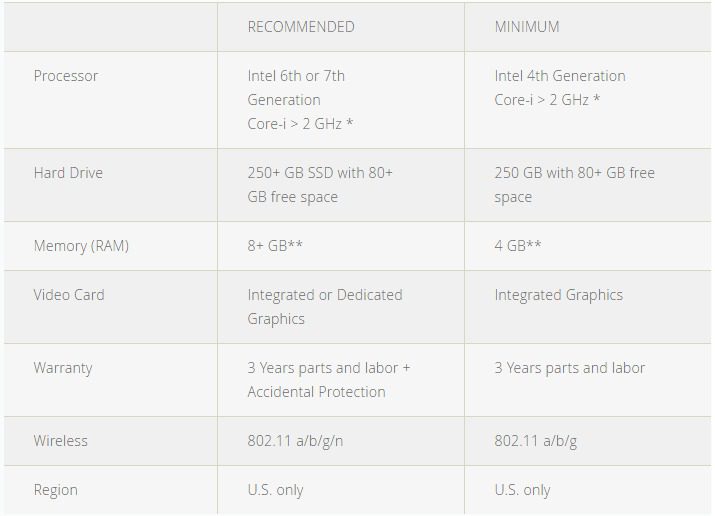
Technical specifications recommended for UCLA Anderson MBA students.
Many of the specifications UCLA Anderson details in their recommendations for students, such as the 4 GB of memory, come standard with most mid-level to premium-level laptops. For the unfamiliar, 6th and 7th generation processing units are also standard for any recently-purchased PC. The last 4th generation Intel processor was shipped in early 2015.
Using UCLA Anderson’s guideline as an informal rule of thumb, we’ve broken down what optimal devices you should be looking for if you’re enrolling in an MBA program, or need an immediate upgrade while you continue your studies.
Looking for Something Affordable
For those in the market for a more affordable machine or are concerned their recently purchased Chromebook isn’t up to par, there are more options than ever in the affordable laptop market. The Acer Aspire E 15, the world’s best-selling laptop, is among the most affordable bets available. Lauded by Laptop Mag, which called it the best sub-$500 laptop on the market, the Acer Aspire E 15 starts at a surprising $350, or, $429 coupled with Windows Office. The standard $350 model comes with an Intel i-3 7th generation processor and 4 GB of standard memory with numerous upgrade options available.
For a slightly larger investment, however, MBA students may be hard-pressed to look at the Lenovo ThinkPad 13.
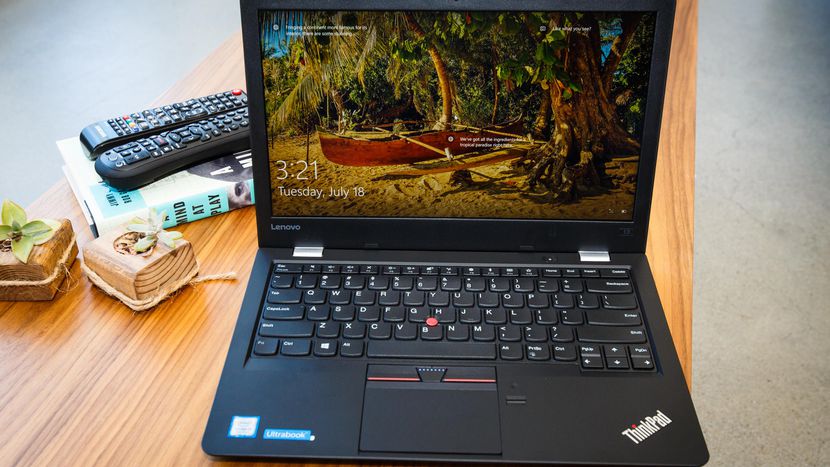
Lenovo ThinkPad 13/Photo via CNet
The ultra-durable (military-tested, in fact) ThinkPad has become a staple model for the business community. Starting at just under $500, the ThinkPad 13 has numerous available upgrades with an astounding 12-hour battery life. For those enrolled in or joining an MBA program, the model comes with a standard 4 GB of memory, but requires an upgrade to an Intel 7th generation processor.
The Optimal Mid-Tier Option
For those looking to invest a bit more in your purchase, Dell’s mid-tier XPS and Inspiron models might be the best machine upgrades without going the bank-breaking route.
The award-winning XPS models have become the crown jewel of the laptop market for the past few years, rewarded by outlets like Laptop Mag, PC Magazine, and TechRadar as one of the best computers on the planet. The XPS 13, starting at $799, comes packed with the latest 7th generation Kaby Lake Intel processor, providing a visual performance that cannot be matched by even the best affordable options. With some welcoming but not totally necessary upgrades, the not-yet-released 2018 model will sport a slightly reduced price even with the fully-packed new specs, including the 8th generation Intel i-7 processor, 8 GB of memory and 256 GB of SSD storage. Still, for MBA students, the standard XPS 13 or slightly larger-sized XPS 15 are more than enough to start.
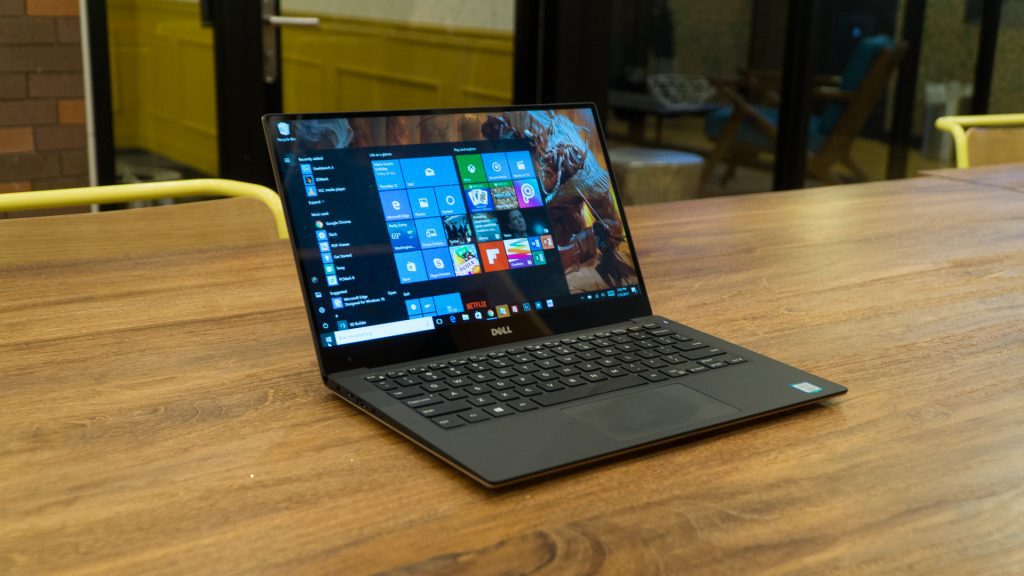
Dell XPS13/Photo via TechRadar.
High Rollers
No one will argue going for the affordable route, but, let’s be honest for a moment. If you’re seriously considering enrollment in an MBA program, or are already enrolled in business school, dishing out a couple hundred more bucks for a top-tier laptop model doesn’t even come close to tuition rates. Plus, if you’re looking at the new laptop as an investment, then providing some more resources might be the best choice you can make.
Beyond the $1,000 benchmark, the aforementioned Mac becomes obvious. The visually-stunning new MacBook Pro may be the most hip offering out there, even with the $1,499 starting price tag (which jumps to $1,799 with the giddy TouchBar). The 13″ MacBook Pro boasts some of the sleekest industrial design of any available model, although without any available USB ports. To make the machine slimmer than the competition, Apple, to a sea of complaints and curious convictions, eliminated much of the standard ports included in most laptops in favor of adaptable Thunderbolt C ports. For the business student, the model may not seem to be precisely necessary. But for entrepreneurs looking to expand a brand with world-class designs and presentation, there may be no better accompanying device.
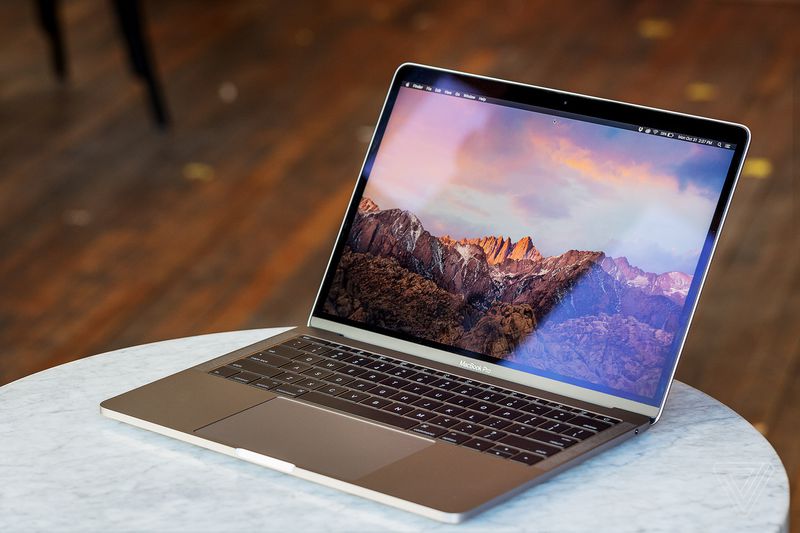
The new MacBook Pro/Photo via Verge.
Still, foregoing a machine that comes complete with Windows OS isn’t recommended for MBA students. For those that prioritize sleek exterior design and slim portability, then why not go right to the source? Microsoft’s endearing Surface Pro is among the world’s most beloved models, called the “Best Laptop Right Now” earlier this year by Verge.
“Microsoft’s new Surface Laptop is the best laptop for most people because it blends power, portability, and battery life better than any other computer. It has a great keyboard and trackpad; a beautiful, high-resolution touchscreen; and comes in four different colors. It uses Intel’s latest processors and can be specced out with up to 16 GB of RAM and 1 TB of storage.”
Like the aforementioned Dell XPS 13, the Surface starts at $799, but fully modifying the machine is probably the way to go. Unlike the other models mentioned, however, Surface Pro owners have the option to immediately upgrade to Windows 10 Pro for free. This offers easily usable features welcome to any business school climate, along with the standard Intel 7th generation processing unit.
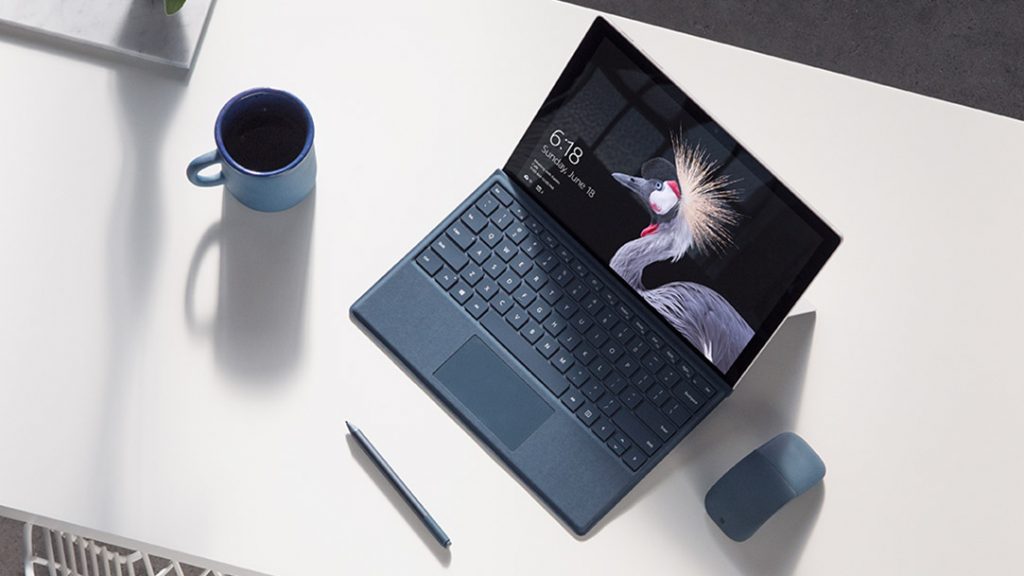
Microsoft Surface Pro/Photo via Microsoft
When Should You Buy a New Laptop?
According to Cnet, the right time to buy a laptop might not be so obvious, like Black Friday. Rick Broida writes, “Sure, you’ll see some low-end laptops priced to move, but high-end models—gaming laptops, ultraportables and the like—don’t usually see big Black Friday price cuts. Rather, history suggests that these machines sell for less in the summertime, during back-to-school sales.
For those looking to invest in a higher-end model, do not expect sales any time soon—if at all. Optimally, whichever laptop you have must be ready before the start of the MBA program. Some schools, like the aforementioned UCLA Anderson School of Management, require a laptop review months before the program begins, so a purchase is better made sooner than later.
